Ewing Surname Ancestry ResultsOur indexes 1000-1999 include entries for the spelling 'ewing'. In the period you have requested, we have the following 412 records (displaying 181 to 190): Single Surname Subscription | | | Buying all 412 results of this search individually would cost £2,280.00. But you can have free access to all 412 records for a year, to view, to save and print, for £100. Save £2,180.00. More... |
These sample scans are from the original record. You will get scans of the full pages or articles where the surname you searched for has been found. Your web browser may prevent the sample windows from opening; in this case please change your browser settings to allow pop-up windows from this site. Dissolutions of Partnerships
(1857)
Trade partnerships dissolved, or the removal of one partner from a partnership of several traders, in England and Wales
EWING. Cost: £6.00.  | Sample scan, click to enlarge

| Masters and Mates of Merchantmen: Certificates of Competency
(1857)
The Mercantile Navy List and Annual Appendage to the Commercial Code of Signals for All Nations, edited by J. H. Brown, was published By Authority in 1857. It includes this full list of 'Masters and Mates who have passed their examination and obtained Certificates of Competency', from number 1 to number 15816, except for those whose certificates had been cancelled. The first column gives the number of certificate; the second column full name, surname first (an asterisk before the name denotes those who are found qualified to act in fore and aft-rigged vessels only; two vertical lines denotes in North Wales fishery only; a double dagger, passed the examination in steam; and a dagger refers to honorary testimonials, details of which are printed at the end of the section. A B C D are the distinguishing letters for the four classes of Meteorological Observers); third column, class examined (1 ex, 1, 2 and 3 denote First Extra, First, Second and Third Class Master's Certificate, granted under the Voluntary Examination, by Order in Council dated August 1845; Ex C, Master Extra; O C, Master Ordinary; 1 M, First Mate; O M, Only Mate; 2 M, Second Mate; L. R. N., Lieutenant Royal Navy; M. R. N., Master Royal Navy; E. I. C., East India Company; M. I. N., Master Indian Navy.); fourth column, year of certificate (where there are two dots, this is to represent a 'ditto' to the year next above); fifth column, Examining Board (Aberdeen, Belfast, Bristol, Cork, Dublin, Dundee, Glasgow, Greenock, Hull, Leith, Liverpool, London, Newcastle, Plymouth, Shields or Sunderland).EWING. Cost: £4.00.  | Sample scan, click to enlarge
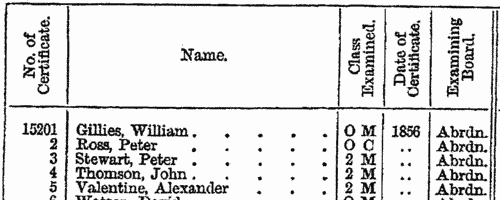
| Anglican Clergy in England and Wales
(1858)
The Clergy List for 1858 includes this comprehensive list of Anglican clergymen in England and Wales, whether beneficed or not. The names are arranged alphabetically by surname, and christian name or initials, with degree, and current office.EWING. Cost: £4.00.  | Sample scan, click to enlarge

| Scottish Bankrupts
(1858)
Perry's Bankrupt and Insolvent Gazette, issued monthly, included lists of sequestrations of Scottish bankrupts' estates. The initial entry gives the name of the bankrupt (surname first, in capitals), trade and address; the dates and place of the stages of the sequestration process, and the date by which claims against the estate were to be lodged. This is the index to the names of the bankrupts, from the issues from January to December 1858: it also covers dissolutions of partnerships in Scotland, and the names of trustees, assignees, attorneys &c. mentioned in these Scottish cases.EWING. Cost: £6.00.  | Sample scan, click to enlarge

| Boys entering Trinity College, Glenalmond
(1859)
Trinity College, Glenalmond, Perthshire, was originally founded as a college at which young men might be trained for the ministry of the Scottish Episcopal Church, and the sons of the laity might be educated and brought up in the faith and tradition of the Church. In 1876 the Theological College was transferred to Edinburgh, Glenalmond remaining as a boys' school. This second edition of the school register, edited by G. St Quintin, was published in 1955, incorporating the text of the first edition prepared by E. W. Neish. The scholars are listed by term of entering the school, and then alphabetically by surname; the details then given are full christian names, date of birth; name of father; any distinctions within the school; and then a career synopsis, with date and place of death where known. EWING. Cost: £6.00.  | Sample scan, click to enlarge
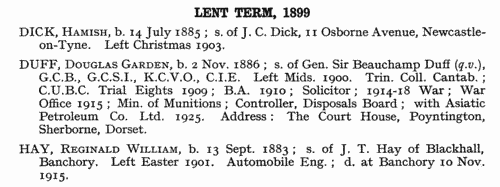
|  Members of the British military train fighting in China
(1856-1860) Members of the British military train fighting in China
(1856-1860)
The China Medal was awarded to soldiers and sailors who took part in the prosecution of the war against the Chinese from 1856 to 1860. Separate clasps were awarded for men who had been in receipt of the China Medal of 1842; for being actually present at Canton on 28 and 29 December 1857, when that city was bombarded and finally captured; for being actually engaged in the operations which ceased with the first capture of the Taku Forts, 20 May 1858, and led to the Treaty of Tientsin; for being actually present at the capture of the Taku Forts 21 August 1860; and for being actually present before Pekin the day the gate of that city was given up to the allied (British and French) army, viz. on 13 October 1860. Among the recipients of the medals were members of the Military Train.EWING. Cost: £8.00.  | Sample scan, click to enlarge

| Boys entering Trinity College, Glenalmond
(1860)
Trinity College, Glenalmond, Perthshire, was originally founded as a college at which young men might be trained for the ministry of the Scottish Episcopal Church, and the sons of the laity might be educated and brought up in the faith and tradition of the Church. In 1876 the Theological College was transferred to Edinburgh, Glenalmond remaining as a boys' school. This second edition of the school register, edited by G. St Quintin, was published in 1955, incorporating the text of the first edition prepared by E. W. Neish. The scholars are listed by term of entering the school, and then alphabetically by surname; the details then given are full christian names, date of birth; name of father; any distinctions within the school; and then a career synopsis, with date and place of death where known. EWING. Cost: £6.00.  | Sample scan, click to enlarge
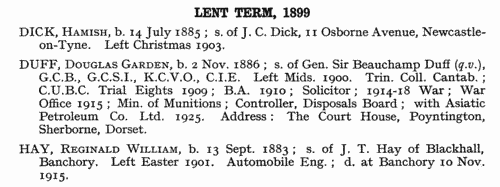
| Members of Oxford University
(1860)
The Oxford University Calendar for 1860 includes this list of all living members of the university, i. e. not only undergraduates and members of staff, but also all surviving graduates from earlier generations. The names are arranged alphabetically by surname, then by college in order of foundation. Surnames are given, initials, highest degree, name of college, and then the year of graduating the first degree. For undergraduates only name and college is given. An asterisk before a surname indicates a member on the foundation of the college. EWING. Cost: £4.00.  | Sample scan, click to enlarge
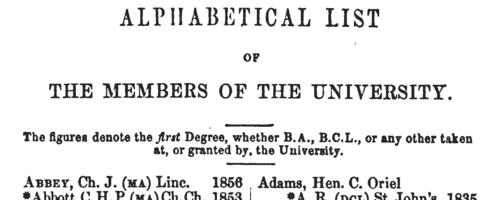
| Officers of the British Army
(1860)
The New Annual Army List first lists officers of the rank of major and above, by rank, and with dates of appointment to each successive higher rank, and (where appropriate) when placed on half pay. An asterisk indicates temporary rank; a superscript p shows that a commission was purchased; a dagger shows officers on the half pay of their last regimental commission. An ornate W indicates those officers actually present in any of the actions of 16, 17 or 18 June 1815 and therefore awarded the Waterloo Medal; P is put before the name of an officer who served in the Peninsula or the South of France; T for the Battle of Trafalgar; VC for the Victoria Cross. For each officer in this section, the final column notes his then present or immediately former regiment and/or office, if any. Next, all the officers of the army are listed, down to the rank of ensign, by regiment or corps, giving rank, name, date of rank in the regiment, and date of rank in the army, with occasional further notes. Again, holders of medals are duly noted, as in the first list. For each regiment the paymaster, adjutant, quartermaster, surgeon and assistant surgeons are named, as well as the civilian agent; and the regimental motto, battle honours, and colours of the facings and lace of the dress uniform are stated. After the British regiments of the line, the Rifle Brigade, the officers of the West India infantry, the Ceylon rifles, the Cape Mounted Riflemen, the Royal Canadian Rifles, St Helena Regiment and the Gold Coast Artillery Corps are given; then the officers of the garrisons and other military establishments; the Royal Artillery; Royal Engineers; Royal Marines; Commissariat Department; Medical Department; Staff Officers of Pensioners; Chaplains' Department; Staff (of Great Britain, Australia, Bahamas, Bermuda, British Columbia, Cape of Good Hope, Ceylon, East Indies, Falkland Islands, Gibraltar, Heligoland, Hong Kong, Ionian Islands, Jamaica (including Honduras), Malta, Mauritius, Newfoundland, North America, St Helena, the Western Coast of Africa, and the Windward and Leeward Islands); Military and Civil Department; and Barrack Masters. Then there is a separate list of officers retained on retired full pay and half pay (including the German Legion, the Brunswick Cavalry, the Brunswick Infantry, Chasseurs Brittaniques, Royal Corsican Rangers, the Greek Light Infantry, Royal Malta Regiment, Meuron's Regiment, Roll's Regiment, Sicilian Regiment, Watteville's Regiment, the York Light Infantry Volunteers, Foreign Veteran Battalion and the Foreign Corps of Waggoners).EWING. Cost: £4.00.  | Sample scan, click to enlarge
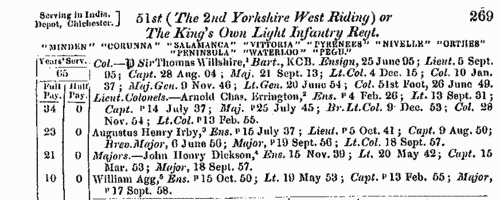
| Civil Service Appointments
(1861)
The Civil Service Commission published an annual list of all persons who had obtained certificates of qualification for appointment in the various public departments. The list gives full name (surname first); department (such as Post Office, or Inland Revenue); situation (such as Letter-carrier, or Clerk); and date of certificate. Candidates whose names are preceded by a dagger obtained appointments as the result of competition; a double dagger indicates open competition. Those whose names are preceded by an asterisk obtained honorary additions to their certificates either for proficiency in extra subjects chosen by themselves, or for marked proficiency in the prescribed subjects. Then follows a further list of these candidates who had obtained Honorary Additions to their Certificates in this way: giving name (surname and initials); position in the service (department and situation); subjects for which honorary additions were made; and 'extent of knowledge displayed' (such as Creditable, Fair, or Very Creditable). 1 January to 31 December 1861.EWING. Cost: £4.00.  | Sample scan, click to enlarge
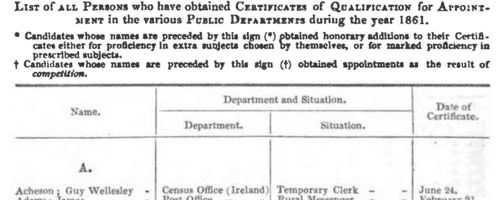
|
Research your ancestry, family history, genealogy and one-name study by direct access to original records and archives indexed by surname.
|













